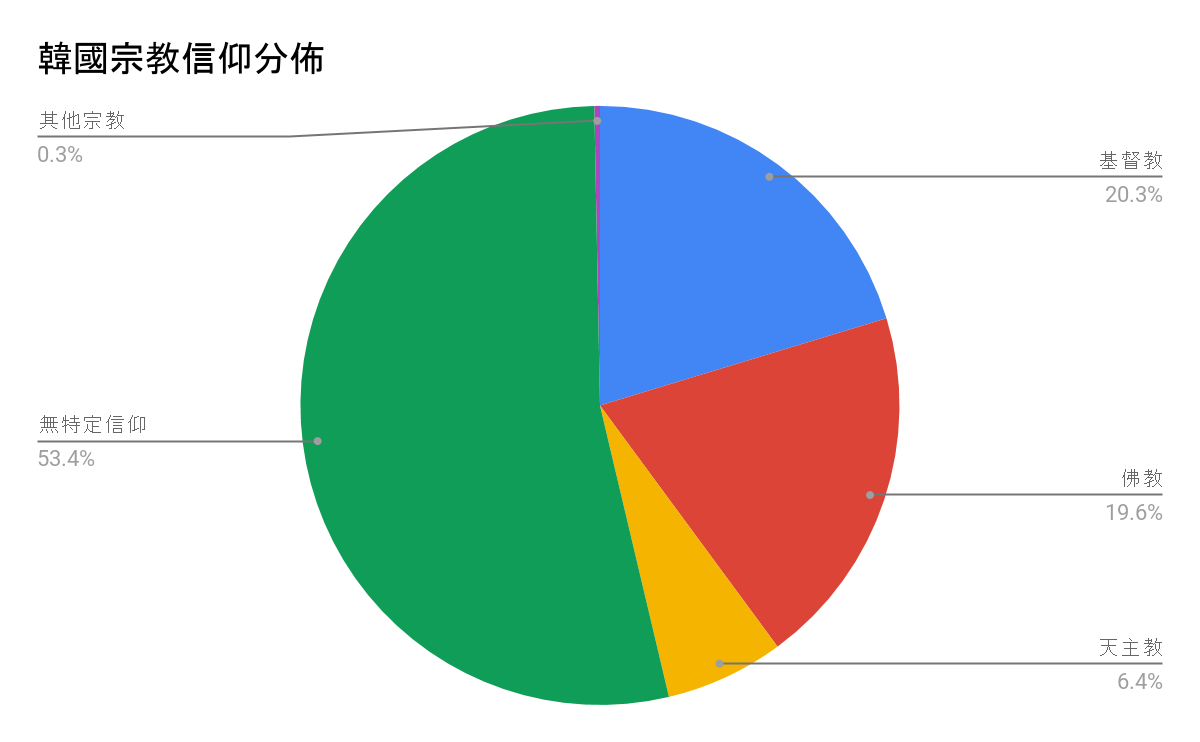[Looking at Korean dramas and talking about Korea] "Extraordinary School Archives": The "paradoxical religion" and its controversy over the contention of a hundred schools of thought in South Korea
Adapted from Zheng Shilang's novel "Health Teacher Ahn Eun Young" (보건교사안은영, 2015), "Extraordinary School Care Archives" , which was released on Netflix at the end of September, can be said to be one of the most watched fantasy Korean dramas in the second half of 2020. In addition to the combination of popular actors Jung Yumi (정유미, 1972~) and Nam Joo Hyuk (남주혁, 1994~), the plot setting of "use toy swords and BB guns to destroy invisible monsters" also makes people feel childish Fun and fresh. However, compared to the protagonist Ahn Eun-young who blesses and performs exorcism through the tokens of various religions, some religions that actually exist in Korea have been accused of being the source of social unrest.

Just like Taiwan, the Korean constitution clearly states that the people enjoy freedom of religion, so Korean religions can be said to be contending with each other. Although according to statistics, more than half of the people said that they did not believe in a specific religion, the recent spread of the epidemic has also brought many controversial religions and the social problems they caused to the surface. The religion is commonly referred to in South Korea as "paradoxical religion". Today's [Looking at Korean Dramas and Talking about Korea], the author will introduce the current state of religion in Korea, as well as several representative "paradoxical religions", as well as their impact on Korean society.
Christians account for 23%, and more than half of South Koreans have no specific faith
When it comes to the rise of Christianity, only the Philippines can match South Korea in East Asia. According to a survey conducted by the Korean Council of Christian Pastors (한국기독교목회자협의회) in 2017, among people over the age of 19 in the country, about 23.3% of the population believe in Christianity, which is the religion with the largest number of people in the country, followed by Buddhism and Catholicism accounted for 19.6% and 6.4% respectively. But it would be a big mistake to think that South Korea is a Christian country, because according to the same survey, a whopping 54% of South Korea's population has no particular faith.

Although less than half of the population is religious, South Korea's religion is quite diverse. According to the tree wiki classification, the main religious groups in Korea can be divided into Christianity (개신교), Buddhism (불교), Catholicism (천주교), Confucianism (유교), Won Buddhism (원불교), Cheondoism (천도교) and the Korean Ethnic Religious Agreement Meeting (한국민족종교협의회) and other seven.
Among the seven major religious groups, the first three are not unfamiliar to Taiwanese. As for Confucianism , it is a religion that believes in Confucianism. Although it began to decline with the introduction of Western religions, its ancestor worship rituals and ethical thoughts are still deeply rooted. In the life of Koreans, there are also many educational institutions that still inherit Confucian classics such as universities and the Analects of Confucius.

The Fifth Circle Buddhism is a new religion founded by Park Chung-bin in 1916. Although it shares the same world view as Buddhism, it has its own costumes and rituals. People are also the representative of Korean national religion. On the other hand, Cheondaoism inherited the emerging religion of North Korea's Dongxuejiao, combining Confucianism, Buddhism and Taoism, with the idea of equality, and was active in the period of the Korean independence movement. As for the last "Korean Ethnic and Religious Council", it was a group co-founded by other religions in 1985. At the beginning, it had a total of 33 members. As of 2015, there are still 12 groups that are still active.
As the saying goes: "A big tree must have dead branches." In Korea's diverse sectarian and religious atmosphere, "paradoxical religions" that use belief to cover crimes have also begun to appear, causing serious social problems.
False beliefs, true crimes, "paradoxical religion" have become a social concern
Unlike so-called heresies, "paradoxical religions" do not offer different interpretations of the teachings of existing religions, but rather "organize religions to conduct criminal or immoral acts, thereby causing social chaos or adverse effects." False religions are not only attached to Christianity, Catholicism, Buddhism, Taoism, Islam and other systems, but even alien religions. Once combined with political power, their impact on society will be more serious.
Including the "Eternal Church" (or Eternal Life Church), which caused political disturbances and eventually led to the impeachment of former South Korean President Park Geun-hye ; during the epidemic, the "Shincheonji Church", which held assemblies regardless of quarantine measures, led to epidemic prevention disasters. The incident is showing that "paradoxical religion" has seriously endangered South Korea's national security. However, the social problems brought about by these groups can actually be seen as early as when Japan colonized Korea.
According to the online media " Sunday Current Affairs ", the most representative "paradoxical religions" in Korean history include Baekbaek (백백교), Song Paradise (아가동산), Eternal World (영세교) and Almighty God. Teaching (전능신교) etc. Each religion has different regulations and requirements for believers, and also has its own criminal history.
The Baibai Sect, founded in 1923, not only requires male believers to donate all their property, but female believers also “give up” themselves to its leader, Jeon Longhai (전용해). There has even been an incident in which 464 believers were killed for disobedience. . Following the discovery of Jeon Yonghae's corpse in Yongmun Mountain, Gyeonggi Province in 1937, the relevant cadres were sentenced to death or life imprisonment in 1940, and the Baek Baek religion disappeared. Jeon Yonghae's body was once used as a specimen of a criminal and was placed in the National Institute of Investigation of Korea, and it was not cremated until 2011.
Song of Songs Paradise, founded in 1981, regards believers as "human resources" and not only requires the donation of private property, but also must work on farmland and factories to contribute labor. After three believers were killed, the officials of Song of Songs Park were arrested, but the leader Kim Ki-soon (김기순) was sentenced to 4 years in prison and a fine for tax evasion, embezzlement and violence because of insufficient evidence. Surprisingly, after being released from prison, Kim Ki-soon founded the New Country Record Store (신나라레코드), which is still one of the largest chain record stores in Korea.
The Eternal Church, which was dismissed four years ago, was founded in 1970 by Choi Taemin (최태민). Not only does he claim to be Tangun and claim that he is a god, but Choi Taemin also emphasizes that he can cure diseases and perform spells. Choi Taemin's daughter Choi Soon-sil is said to have the same "magical power". Through his best friend Park Geun-hye, Choi Soon-sil took control of South Korea's state affairs and secrets, and also ignited the anger of the South Korean people, causing them to take to the streets and dismiss the president.
The last "Almighty God" with an unknown year of founding originated in China and became widely known because of a murder incident. The five believers who committed the crime afterwards confessed that they were preaching to the victim at the time, but after the mission failed, the perpetrator actually called the other party a demon, and then violently caused the other party to die. Although the murder incident caused an uproar, with strong financial support, Almighty God is still active in Seoul, Gangwon-do, Chungcheongbuk-do and other places.
In addition to the above four religions, the most notorious "true religion" in modern Korea is probably "Do you know the Tao?" (도를아십니까). Similar to Taiwan's common "love pen" deception, the Daejun Truth Society (대순진리회) missionaries all over Korea will target the single and seemingly easy-to-follow targets, and start with "Do you understand the Dao?" On the pretext that the other party needs the ceremony to change the fortune, etc., defrauding high fees.
Although "paradoxical religions" are all sorts of strange things, whether it's the Baibai Sect founded during the Japanese occupation, or the Daeun Truth Society that is still active in modern society, the ultimate goal is usually money. At this point, some people may ask: "Why do Koreans always learn badly?" The answer may be related to South Korea's economic development in recent years.
Bipolar society and Confucian education give birth to "paradoxical religion"
"The polarization of society has caused people to lose hope and even despair, making South Korea a hotbed of non-religion." After the Shincheonji incident, Pei Handong (배한동, transliteration), an emeritus professor of political science at Kyungpook University, once commented in the media that South Korea's economic , While the rapid development of material conditions, it also strengthens the sense of relative deprivation in the mind. Coupled with the social atmosphere that encourages competition, it has led to the rapid collapse of trust between people.
"In our society, in addition to hotels, bars, and KTVs, the number of churches is also increasing." Professor Pei further explained in the article that religion can provide spiritual refuge under huge social pressure, but it also makes "seemly" rather than religion" can take advantage of it.
In addition to the social atmosphere, Quan Wulu (권오율, transliteration), a professor at Simon Fraser University in Canada, believes that under Confucian education, Koreans are accustomed to obedience, respect for ethics, and advocate authority, and lack of training in cultivating self-awareness directly leads to personal judgment The ability is low, and it is easy to become a believer of "paradoxical religion".
It is difficult to solve countless realistic issues in "paradoxical" film and drama works
Korean dramas often reflect social reality. In recent years, they include "Save Me" (구해줘, 2017), "Children of Little Gods" (작은신의아이들, 2018), and "Sapopa" (사바하, 2019), all of which are based on religious crimes. themed works. The director of the film "Stalling Train", Yeon Sang-ho (연상호, 1978~), once focused on "paradoxical religion" and completed the animated film "The Hypocrite" (사이비, 2013), which was shortlisted for Asian animation at the Toronto Film Festival and won the Spanish Best Animated Feature at Sitges International Film Festival. However, no amount of works can prevent the "paradoxical religion" from causing harm to society again and again.
"They say I was born to be loved, but you say they are liars?"
In the movie "The Hypocrite", the replies of believers after learning that they have been deceived may point to the state of mind of many victims that "knowing that there are tigers in the mountains, they prefer to walk in the mountains." In the final analysis, the reason why people seek religion is that they encounter a bottleneck in reality and can only seek spiritual comfort. Rather than enacting laws or requiring people to have the ability to think independently, achieving social equality may be the best way to eliminate "paradoxical religion".
Like my work? Don't forget to support and clap, let me know that you are with me on the road of creation. Keep this enthusiasm together!





- Author
- More